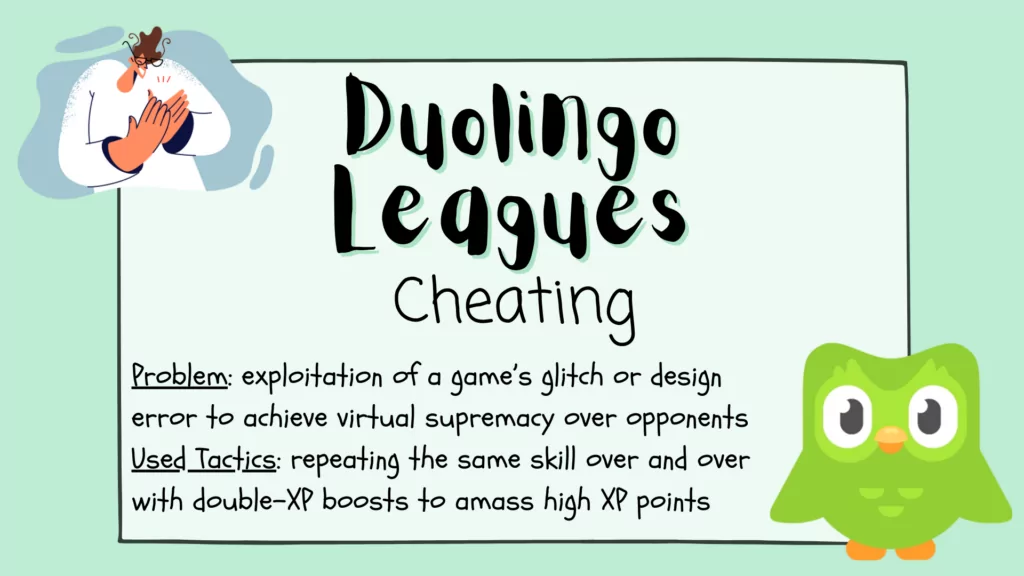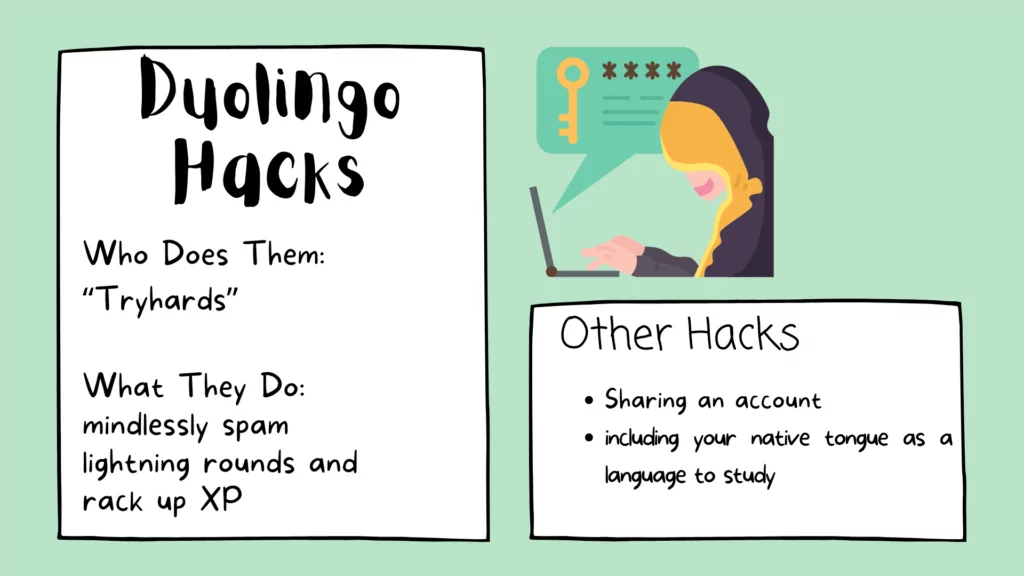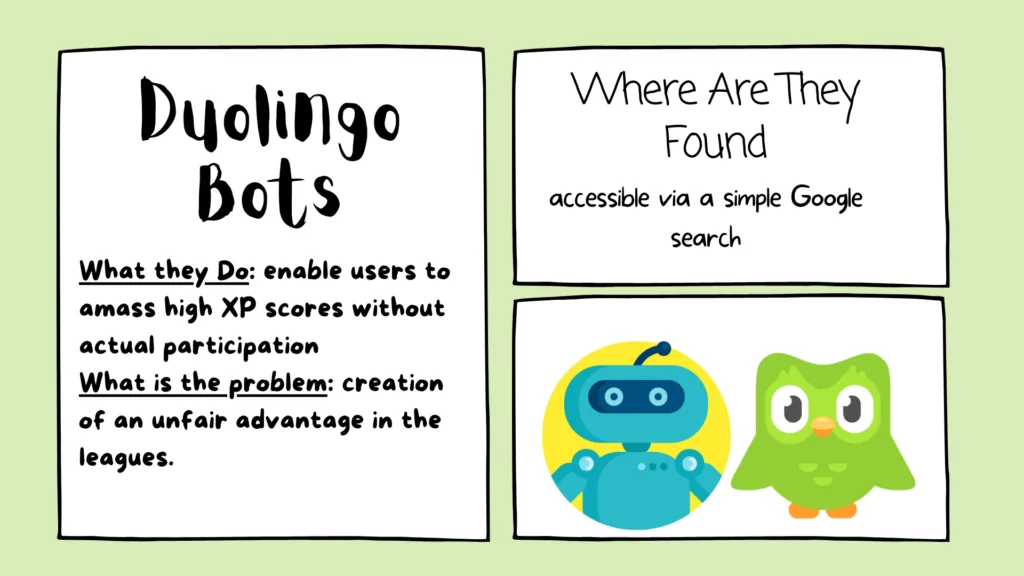The world of online language learning is a fascinating one, often filled with questions that provoke a lot of debate. One such question that has been the subject of much discussion recently is: Is there cheating on Duolingo? This question was spurred by observations of incredibly high XP numbers in certain leagues, leading to speculations about possible hacks being used on the platform.

✅ AI Essay Writer ✅ AI Detector ✅ Plagchecker ✅ Paraphraser
✅ Summarizer ✅ Citation Generator
The Intrigue of High XP Scores
Christopher Robertson, a language enthusiast and active Duolingo user, first raised his concerns. “I have observed ridiculously high XP numbers on both Obsidian and Diamond leagues. That makes me wonder about people using hacks on Duolingo,” he shared. Robertson was not the only one intrigued by this phenomenon. Other users shared similar concerns about the platform’s integrity, questioning why Duolingo’s gamification system exists if cheating appears widespread and no measures are taken against it.

The Quest for Understanding Cheating and ‘Cheezing’
A discussion then emerged about the distinction between ‘cheating’ and ‘gaming’ or ‘cheezing’ the XP system. Sarah Patterson, a software engineer with a passion for learning Spanish, described cheating as using a bot and doing nothing to improve your language learning process. In contrast, ‘cheezing,’ a term from the gaming world, refers to the exploitation of a game’s glitch or design error to achieve virtual supremacy over opponents. In the context of Duolingo, ‘cheezing’ might include strategies like repeating the same skill over and over with double-XP boosts to amass high XP points. Although this doesn’t offer any real language learning, it leads to a higher XP number.
The Motivation Behind Gaming the System
So why do people resort to such tactics? According to Mike Chen, a psychologist with an interest in the effects of gamification, it’s not about cheating, but it’s also not beneficial for language learning. “Amassing very high XP by repeating the same skill over and over, maybe a very low-level skill in a language you aren’t even interested in making any progress in, it’s not cheating, but it’s certainly not good for your language learning,” he opined.
Moreover, sharing an account or adding your native tongue as a language to study are other means of gaming the system. These actions, while not directly against Duolingo’s rules, certainly seem to go against the spirit of the app, which is to foster authentic language learning.

The Role of Competition
For some users, such as Anna Johnson, a competitive spirit plays a significant role in their journey to learn a foreign language. She confessed that she practices more than usual just to surpass others in the league. “The satisfaction of seeing you’re in first place by a wide margin of XP is a nice boost,” she shared. However, others take a different stance. John Davis, a language pundit and Duolingo user, said, “Leagues are everything. If you don’t get top 3, then you’re not trying hard enough. Anything under top 5 is mediocre – garbage.”
On the other hand, there are users like Emily Smith, a language learner who uses Duolingo to learn Italian. She shares, “I’m sure there is [cheating], but I honestly don’t care. I’m on there to learn a language. Placing first in a league is fun because I have a tendency to be competitive, but at the end of the day, it has nothing to do with if I’m going to get good at my TL.”
The ‘Duolingo Bot’ Controversy
However, amidst all these debates, some users pointed out the existence of Duolingo bots. These bots, which are accessible via a simple Google search, supposedly enable users to amass high XP scores without actual participation, creating an unfair advantage in the leagues.
George Thompson, a cybersecurity expert, voiced his concern about this. “Duolingo and the community do not seem to care, or they are in denial,” he said. “Nobody has ever been banned from Duolingo for cheating – that’s pretty much the answer.”
In contrast, some argue that not all high XP scores are the result of cheating. Lisa Morgan, a seasoned Duolingo user, stated that most users she had come across who had been accused of cheating were just using known methods to gain XP quickly. “It’s rarely if ever cheating. Does it suck that some people choose to make league a worthless motivator by ensuring that most of the people at the top are getting more XP than would be reasonable from actually learning? Yes. But there will always be shitty people.”

She also hinted at a delicate balance that Duolingo has to maintain. Any update that makes gaining XP less effective also brings complaints from the user base, making it a complex issue for Duolingo to address.
The Tryhards
An interesting category of users also emerged from this discussion: the ‘tryhards’. These are users who make the most of features like Duolingo’s ‘Super Duo’ trial to mindlessly spam lightning rounds and rack up XP. Alex Bennett, a former ‘tryhard’ himself, shared, “Since your brain is moving so fast and at such a high momentum, then you just immediately click on the other lightning round after the previous one finishes. Then you answer the questions by reflex with basically no thinking at all. You can get 2k XP per day by doing this.”
However, he cautioned against adopting such a competitive approach, as it could lead to burnout and detract from actual language learning.
The Nonchalant Bunch
In the end, there are users like Ellen Rodriguez, who don’t bother about leagues or XP at all. “I don’t pay attention to XP or any of that other stuff. I don’t even know how to look at someone else’s XP,” she said.
Another user, who wished to be known only as ‘The Competitor’, shared a different perspective. He enjoys the competition and can score up to 4500 XP per hour on weekdays by doing Match Madness Extreme level 12. “I just love to compete, and I don’t need to stay the whole day doing Duolingo,” he said.
In Conclusion
The debate about cheating on Duolingo is as diverse as the users on the platform. While some users feel cheated by the high XP scores, others game the system to their advantage or don’t pay attention to the XP at all. Meanwhile, Duolingo faces the tough task of maintaining the balance between keeping the platform engaging with competition and ensuring a fair and conducive environment for genuine language learning. For now, the question remains: Is there cheating on Duolingo, and if so, how should it be addressed?
The Learning Magic of Duolingo’s Science-Backed Methodology
As we further delve into the realm of Duolingo, let’s start a journey to understand the scientific methodology that underpins its language learning approach. At the heart of Duolingo’s success lies its clever blend of cognitive science and technology, a dynamic fusion that drives its unique pedagogical model. This methodology is designed not just to facilitate language acquisition, but also to sustain learner engagement and motivation, crucial elements often overlooked in traditional language learning platforms. From the sequencing of linguistic concepts to the clever use of gamification, Duolingo employs a number of proven strategies to ensure that its users don’t just learn a new language but truly enjoy the process.
Chunking
Cognitive science informs us that our brains learn best when presented with new information in small, digestible chunks, a process known as “chunking”. Duolingo harnesses this principle, presenting language learners with bite-sized lessons that they can complete in just a few minutes a day which seems to work. This approach is ideal for the modern, busy learner, and helps to foster a consistent learning habit, which is essential for effective language acquisition.
“Spaced repetition” technique
This learning strategy involves the review of previously learned material at gradually increasing intervals. Studies have shown that this method can significantly improve the retention of new information. Accordingly, Duolingo’s software continually revisits past lessons and vocabulary at strategic points to embed this knowledge deep within the learner’s memory.
Gramification
But the science behind Duolingo’s methodology doesn’t stop there. Gamification elements are woven into the platform to boost motivation and enjoyment. This approach, influenced by research into the psychology of motivation, rewards users with points, badges, and league placements as they progress, turning the often challenging task of language learning into an engaging game.
AI & Duolingo
Moreover, Duolingo employs artificial intelligence to personalize learning pathways. By adapting to a user’s performance, the AI can present more difficult tasks when a learner is ready for the challenge, or revise certain areas when a learner is struggling. This form of adaptive learning is a powerful tool, aligning closely with the scientific understanding that personalized, learner-centred education leads to better outcomes.
Indeed, the blending of these scientific principles with a user-friendly interface and engaging design is the secret behind Duolingo’s widely acknowledged success. The science underpinning its methodology ensures that users are not just memorizing words, but are actively engaging with and absorbing the language, leading to meaningful and long-lasting learning.
Related stories:
- Best assignment writing service: Our top 10 – Reserve Version
- Best assignment service: Our top 10
- Ground News Review 2025
- Media Bias Fact Check Review 2025
- PolitiFact Review 2025
Follow us on Reddit for more insights and updates.
Comments (24)
Welcome to A*Help comments!
We’re all about debate and discussion at A*Help.
We value the diverse opinions of users, so you may find points of view that you don’t agree with. And that’s cool. However, there are certain things we’re not OK with: attempts to manipulate our data in any way, for example, or the posting of discriminative, offensive, hateful, or disparaging material.






I have a lot of XP on the leader boards and I’m in the diamond league every week. I don’t even know what a bot is and wouldn’t know how to cheat, yet I do get high xp. The thing is I have days I don’t get on very long, but other days I’ll spend a lot of time learning. Some people will look at my points on the leader board and will think I’m cheating, not only am I not cheating, but I actually write out all new words and the more difficult sentences on a piece of paper as I go through each lesson and I still get high XP. I’m very competitive, so I think people that are go off on using all the ways to make XP, but that is not cheating. I do see some that are so high I just instantly give up, because there’s no way to accomplish it.
Just witnessed someone on the leaderboard earn 4000xp in half an hour…impossible!
is either someone who does their streak after they promoted.
The use of Duolingo bots is indeed a worrying trend. I think the onus is on Duolingo to rectify this, as it could lead to a skewed competitive environment.
I’ve noticed that most people accused of cheating are often just exploiting the system. While it’s not in the spirit of learning, it’s hard to stop unless Duolingo changes its XP system.
That’s true. And it’s not just a problem with Duolingo. Most online platforms struggle with finding a balance between engaging users and ensuring fair play.
How could you possibly know 5his? More like guessing. Noone has ever been banned, and getting 3000 xp In 5 mins like someone in my last round is impossible.
I completely agree with Mike Chen’s point about the redundancy of amassing XP through the same skill. It feels like a hollow victory with no real language learning.
Duolingo’s approach to language learning using science-backed methodologies is impressive. However, it seems they have to work on their gamification strategy to make it more balanced.
I’ve observed the same pattern Christopher Robertson mentions. It’s quite disheartening to see such high XP scores when you’re putting in honest effort. Duolingo needs to have stricter rules against such actions.
I personally don’t mind the leagues or the competition. I believe competition fuels learning. Although, I agree that it’s not beneficial if it leads to practices that aren’t helpful for learning.
Lisa Morgan hit the nail on the head. The problem isn’t really with cheating but with how Duolingo deals with XP accumulation. I think there should be caps on daily XP gains.
Yes, XP caps or weighted XP gains based on the difficulty of the exercises might be a solution.
No, the problem is cheating. It takes 10 min to download an automated answer bot that can run all day l9ng. If you think people aren’t doing this, you’re niave.
As a ‘tryhard’ myself, I can say that my focus isn’t on learning but rather accumulating XP. While it might seem fun in the beginning, it’s honestly exhausting and feels like a chore.
That’s the pitfall of gamifying everything. It’s easy to lose focus on the real objective, which is learning.
As a long-time Duolingo user, I’ve seen people go to lengths to get ahead in leagues. In the end, it’s not the XP that counts but the fluency in the language you’re learning.
My name is Mark Shoichet and I am an avid language enthusiast,
I think Ellen Rodriguez’s approach is the best. Duolingo is first and foremost a language learning app. The XP, leagues, and competition are just ways to make learning fun, but should not be the primary focus.
While I agree that Duolingo offers a good platform for language learning, I’ve often found myself demotivated by the high XP scores in my league. It’s like you’re up against an opponent you can never beat.
I think it’s all about perspective. I stopped focusing on leagues a long time ago and started focusing on my language proficiency.
That’s because they are cheating. You can do both – learn a language and cheat to win league. Once you have a bot set up, you click a button and walk away. When you want to learn, you do lessons for real. Bottom line is there are many cheaters on Doulingo, and the company simply doesn’t do anything, and Iikely doesn’t care.
I think it’s important to remember why we are using Duolingo. It’s not about being the top in the league; it’s about learning a language. That’s the real win.
True, but they have the capability to use a “fun factor” to keep people learning more. When that “fun factor” is taken away, some of the incentive to spend more time working at the language is taken away from many who would be encouraged by it. And that’s too bad.